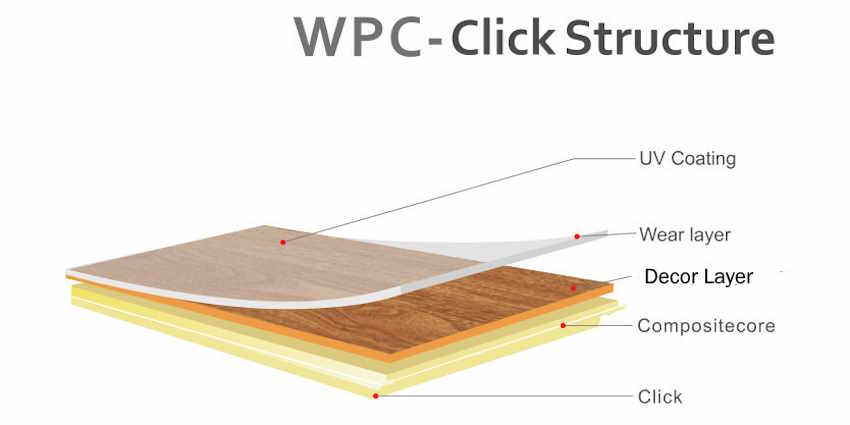A blend of wood fiber and polymers.
What is WPC flooring?
Wood Plastic Composite (WPC) flooring is a type of engineered flooring material that combines wood fibers or wood flour with thermoplastic polymers to create a flooring product that mimics the appearance of wood while offering several practical advantages. WPC flooring is often used as an alternative to traditional hardwood flooring and has gained popularity for its durability, versatility, and ease of maintenance.
This flooring is waterproof* and stain resistant making it perfect for a busy household or commercial environment. Offering a built in underlay and a click lock installation system which helps reduce time taken to install and keep installation costs down.

Wood plastic composite is a popular choice for external decking products and is very well suited to this application.
Is WPC flooring a good option?
A major reason to choose WPC over laminate flooring is that it is a completely waterproof* option, meaning it is ideal for bathrooms, basements and kitchens. It is scratch and wear resistant and with proper care and maintenance it could last between 10 and 15 years years.
WPC is easy to lay and simple to maintain
Any downsides to WPC flooring?
More likely to dent: Compared to SPC rigid core vinyl, WPC isn't quite as durable. That slightly softer core is more comfortable, but it's also more likely to dent if you drop something heavy.
WPC flooring can cost a bit more than other types of vinyl based floor.
WPC floors are more prone to lifting if fitted on an uneven surface, compared to an SPC. The softer core allows the individual tiles to bend and thus can cause the click joints to come apart. However if the base is well prepared and level without bumps or ripples that there should be no issues.
How does WPC flooring compare with other options?
WPC can cost a bit more than other vinyl options.
WPC is much easier to install than a ceramic or porcelain floor and will cost less than many porcelain options.
Maintenance of WPC is simple although multi purpose cleaners are not recommended and anything containing bleach, chlorine or ammonia should not be used. Mostly these cleaning agents will not harm a ceramic or porcelain tile.
Care and maintenance
Best and easiest method is to vacuum (WITHOUT A BEATER BRUSH), dry mop, or sweep your floor at least once a week or more if needed. Do not let sand, dirt, or grit build up; it will act like sandpaper, and dull the finish.
For stubborn stains a dampened cloth with mild soap (Fairy Liquid in UK) should do the trick but general purpose and bathroom cleaning sprays will degrade the finish through time.
Avoid bleach and cleaning agents containing chlorine.
Steam mops are not recommended.
* Waterproof can be interpreted in many ways. The meaning here is than the actual WPC tiles or planks will not be damaged by water, but it is important to understand that water can penetrate the joints. Therefore it is important to quickly wipe up any spills, and in the bathroom do not let water drops or puddles lay on the floor, wipe them up as soon as possible. With common sense and reasonably care you will not have issues.

